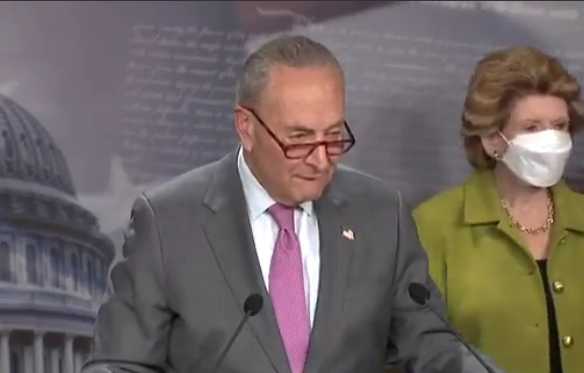“We need more action on legislation that would ban Congressional stock trading. And fewer members of Congress in violation of the rules already on the books.”
A leading government ethics watchdog on Tuesday renewed calls to ban members of Congress from trading stocks during their terms in office after The New York Times published a major investigation revealing that nearly 100 U.S. lawmakers reported trades in companies influenced by their committees.
“People wonder why it’s so difficult for Democrats to convince voters that they’ll improve outlooks for working families.”
“We need more action on legislation that would ban congressional stock trading. And fewer members of Congress in violation of the rules already on the books,” Citizens for Responsibility and Ethics in Washington (CREW) tweeted in response to the report. “It’s time we ban them from buying and trading stocks while in office.”
Sen. Elizabeth Warren (D-Mass.) agreed, tweeting that “it’s long past time to ban members of Congress and their spouses from owning and trading individual stocks.”
The Times report detailed how at least 97 members of the House and Senate “bought or sold stock, bonds, or other financial assets that intersected with their congressional work or reported similar transactions by their spouse or a dependent child.”
“The potential for conflicts in stock trading by members of Congress—and their choice so far not to impose stricter limits on themselves—has long drawn criticism, especially when particularly blatant cases emerge,” Kate Kelly, Adam Playford, and Alicia Parlapiano wrote in their report.
It’s long past time to ban members of Congress and their spouses from owning and trading individual stocks.
Months ago, I introduced the only bipartisan bill in the Senate to get it done.
Congress urgently needs strong reform here — no more delays.https://t.co/mfTCfjaOra
— Elizabeth Warren (@SenWarren) September 13, 2022
“But the Times analysis demonstrates the scale of the issue,” the reporters added. “Over the three-year period, more than 3,700 trades reported by lawmakers from both parties posed potential conflicts between their public responsibilities and private finances.”
The lawmakers are almost evenly split along party lines. According to the Times:
Senator Tommy Tuberville, Republican of Alabama and a member of the agriculture committee, regularly reported buying and selling contracts tied to cattle prices starting last year, even as the panel, by Mr. Tuberville’s own account, had “been talking about the cattle markets.”
Representative Bob Gibbs, an Ohio Republican on the House Oversight Committee, reported buying shares of the pharmaceutical company AbbVie in 2020 and 2021, while the committee was investigating AbbVie and five rivals over high drug prices.
Among Democrats, profiled lawmakers range from conservative Reps. Josh Gottheimer of New Jersey (trades involving 326 companies and 43 potential conflicts of interest) and Minnesota’s Dean Phillips (276 trades, 34 potential conflicts) to progressives including Rep. Ro Khanna of California, who attributed 897 reported trades—which involve 149 potential conflicts of interest—to relatives’ transactions.
People wonder why it’s so difficult for Democrats to convince voters that they’ll improve outlooks for working families.
These conflicts of interest on Financial Services were perfectly fine with Pelosi’s leadership for well over a decade.https://t.co/7PXgMsHsGi pic.twitter.com/isvnCbFrpT
— David Moore (@ppolitics) September 13, 2022
Notably absent from the new report is House Speaker Nancy Pelosi (D-Calif.), who—despite her husband trading as much as $81 million worth of assets between 2019 and 2021, including in numerous companies subject to congressional scrutiny—was excluded because she does not sit on any regulatory committee.
Khanna told the Times that a “highly diversified trust” that is independently managed—such as the one used by his family—is an ethical solution.
“No one should ever have to wonder whether their member of Congress is working for the public interest or their own financial interest.”
“If someone’s coming into a marriage with independent resources, I think that’s the appropriate way to deal with the conflict,” the Silicon Valley multimillionaire said.
Under the 2012 STOCK Act, members of Congress are permitted to buy and sell stocks, bonds, and other financial instruments but they cannot trade on inside information and they must disclose within 45 days any transactions worth more than $1,000 that they or their immediate family members made.
However, as a running investigation by Insider shows, 72 members of Congress have violated the STOCK Act in recent years, with the website reporting Monday that Rep. Chris Jacobs (R-N.Y.) is the latest to get caught breaking the law.
Furthermore, the STOCK Act has been criticized for its loopholes and relative toothlessness. In a bid to address these issues, Democratic Sens. Jon Ossoff of Georgia and Mark Kelly of Arizona earlier this year introduced the Ban Congressional Stock Trading Act, which if passed would compel members of Congress, their spouses, and dependent children to place certain investments into blind trusts or divest them.
Despite support from Pelosi and Senate Majority Leader Chuck Schumer (D-N.Y.), the proposed legislation has stalled, as no version that can garner the support of 60 senators—whose ranks include corporate Democrats like Joe Manchin of West Virginia and Arizona’s Kyrsten Sinema—has yet emerged.
A separate bipartisan measure introduced in February by Sens. Warren and Steve Daines (R-Mont.) along with Reps. Pramila Jayapal (D-Wash.) and Matt Rosendale (R-Mont.) would, if passed, ban U.S. lawmakers and their spouses from owning or trading stocks.
“No one should ever have to wonder,” Warren said at the time, “whether their member of Congress is working for the public interest or their own financial interest.”
Common Dream’s work is licensed under a Creative Commons Attribution-Share Alike 3.0 License. Feel free to republish and share widely.
[content id=”79272″]





